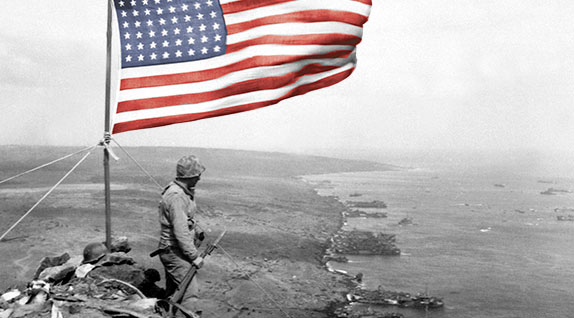 Public Domain/NARA/Wikimedia Commons
Public Domain/NARA/Wikimedia Commons
Article
U.S. citizens are changing their opinions of the nation’s global role. There is a reason this is happening.
Learn the why behind the headlines.
Subscribe to the Real Truth for FREE news and analysis.
Subscribe NowDuring World War II, a tradition was cemented in American culture: singing the national anthem before baseball games. The “Star Spangled Banner” had been used sporadically at events prior to that, but the custom took root in the 1940s. Given the time of national hardship, the U.S. needed any patriotic shot in the arm it could get.
Today, citizens cannot imagine a sporting event without it. Nowadays, though, they usually witness a 21st-century version involving a massive American flag spread out on a field and a roaring jet-plane flyover.
 Public Domain/NARA/Wikimedia Commons
Public Domain/NARA/Wikimedia Commons
Belting out, “Oh say can you see…” at virtually every athletic matchup seems to be a unique American quirk. Other countries sing their anthems at games, but not every single one.
The characteristic is also tied to another U.S. oddity: American pride.
Sure, other nations love their homelands, but U.S. pride has historically been on a whole different level. For decades, the “Land of the Free” has been tied to American exceptionalism—the belief that the country is the indisputable greatest nation of all time.
Yet, while we still sing the words before every sporting game, that distinctive pride is waning. A growing number in the U.S.—58 percent—feel that America is just “one of the greatest countries in the world, along with some others,” according to a July 2014 Pew Research Center report. In addition, 12 percent responded that there are other nations in the world “better than the U.S.” This means that just 28 percent are confident that America “stands above all other countries in the world.”
 Public Domain/NARA/Wikimedia Commons
Public Domain/NARA/Wikimedia Commons
Such a trend is unsurprising when given the barrage of news reports about the shifting global stage. For example, Moscow, not Washington, took the lead on brokering a deal with Syria to dismantle its chemical weapons arsenal. The entire world has derided U.S. intelligence-gathering techniques. There are constant reports on China’s military and economic booms. By one measure, the Asian nation’s GDP surpassed America’s in 2014.
In addition, another Pew poll, this time from 2013, found: “Growing numbers of Americans believe that U.S. global power and prestige are in decline.” Of those surveyed, 53 percent felt that America’s role as world leader is less important and powerful than 10 years ago. This is a 40-year low—the worst since around the end of the notoriously unpopular Vietnam War.
For some, a decreasing belief in American exceptionalism is just a sign that the nation is taking its natural place among countries. Others feel that the loss of this belief is a clear symptom of an impending U.S. downfall—and they want desperately for the “Home of the Brave” to retake its leading place on the world stage.
 Public Domain/NARA/Wikimedia Commons
Public Domain/NARA/Wikimedia Commons
Either way, something definitely has happened to the nation’s pride. And every American should take note.
Perception vs. Reality
While 70 percent of Americans believe the nation is not the greatest, a wealth of statistics paint an entirely different picture. The U.S., on paper, is still the greatest nation in the world.
Look at political power. The Council on Foreign Relations wrote that the nation “has more than forty formal treaty allies—including most members of the world’s largest economic bloc (the EU) and its third largest economy (Japan). Moreover, it boasts friendly relations with a comparable number of other countries—including major emerging players like Brazil, India, and Indonesia. China’s dependable allies can be counted on one finger: North Korea.”
Look at oil production. In 2013, America became the largest petroleum producer in the world. The U.S. Energy Information Administration stated that the nation pumped about 14 million barrels per day in 2014.
Most notably, look at military might. The U.S. spent $619 billion on defense in 2013—more than the next top 11 countries combined. China comes in at a distant second at $171 billion and Russia third with $85 billion.
 Public Domain/NARA/Wikimedia Commons
Public Domain/NARA/Wikimedia Commons
Also consider that the U.S. Navy is the largest and most sophisticated in the world. It has 10 aircraft carriers that can launch airplanes. Only six other countries have an aircraft carrier—one each—and just Italy and India have two. Those of other nations are all smaller than America’s Nimitz-class 1,000-foot-long carriers.
In addition, the Navy boasts 60 destroyers, 22 cruisers, and 70 submarines. Altogether, the U.S. has approximately 473 ships. Battle fleet tonnage, a more accurate judge of effectiveness than the number of ships alone, is greater than the next 13 largest navies combined.
While China is rumored to be building a few more ships this year, the U.S. constructs on average six per year that are almost always larger and more sophisticated. Also, the Navy has ordered two new state-of-the-art carriers to be delivered by the end of 2016.
American dominance also includes aircraft, of which it has 13,683 aerial vehicles (more than Russia, China, India, Japan, South Korea, France and Egypt combined).
 Public Domain/NARA/Wikimedia Commons
Public Domain/NARA/Wikimedia Commons
To ensure it stays the greatest nation, all the U.S. has to do is to hold onto what it has. This would require the nation to rally around the idea and have the political will to make it happen. While this did happen shortly after the September 11 attacks, it did not last.
Home Front
For a classic, long-term example of what would be required to reignite American pride, one must look back to World War II. While still reeling from the Great Depression, U.S. citizens in the 1940s rallied around the war effort to support soldiers overseas. Historians still marvel at what they accomplished.
Information from the Smithsonian Institution described the motivating factors behind the efforts: “Nothing in America went unchanged by World War II. More than 16 million men and women—more than one-tenth of the population—served in the armed forces. More than 400,000 never returned. Those who remained at home found themselves taking on the responsibilities of ‘citizen soldiers’ at every turn of their daily lives. Decisions that were once only personal—what to buy, what to eat, how to spend free time—now had global consequences.”
Everyone was wholly invested: “Posters reminded Americans of the reasons for the shortages and asked them to make do by conserving, by avoiding the black market, and by generally becoming more self-reliant. Nowhere is the totality of the war effort seen more clearly than on posters that connect the campaigns overseas with growing vegetables [to reduce strain on the supply available for soldiers] in a home ‘Victory Garden,’ cleaning one’s plate, or saving bacon grease. (Glycerin in recycled fat was used for ammunition and for some medicines.)” (ibid.).
 Public Domain/NARA/Wikimedia Commons
Public Domain/NARA/Wikimedia Commons
President Franklin Roosevelt challenged the country to get to work.
“Powerful enemies must be out-fought and out-produced…We must out-produce them overwhelmingly, so that there can be no question of our ability to provide a crushing superiority of equipment in any theatre of the world war,” the president declared soon after the Pearl Harbor attack.
The people responded. Elderly quit retirement to help build ships. Women—by the millions—left their positions as stay-at-home mothers to work in airplane and armored-vehicle factories. American civilians built 14,000 ships, 88,000 tanks, and 300,000 airplanes in the four years of war. In 1944 alone, the U.S. constructed more planes than Japan did throughout the entirety of World War II.
Despite only having 5 percent of the world’s population, in 1945, the U.S. produced 50 percent of the world’s manufactured goods.
One shipyard mechanic recounted his experience in the documentary The War: “It was seven days a week…And during the war when it was so strong, it was twelve-hour days five days a week, ten hours on Saturday, eight hours on Sunday, [which made it feel like] you’ve had a week off.”
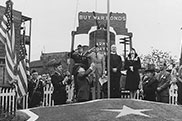 Public Domain/National Archives and Records Administration
Public Domain/National Archives and Records Administration
Amazingly, more than 85 million Americans of the 139 million at the time bought government war bonds. Half of the total cost of war, $340 billion in 1940 dollars, was paid for by income from bonds—even children participated. In 2014 money, that is $2.8 trillion in bonds. In today’s dollars, this would be like every man, woman and child in America investing roughly $8,833 in a war effort.
Imagine modern Americans backing any cause like this—even something non-violent—and supplying that kind of cash. It is unthinkable.
So why the drastic change since then?
War Weary
WWII established the U.S. as a lone world superpower. With its superior military capability, it seemed poised to lead the globe forward.
Yet everything changed with the rise of the Soviet Union and the start of the Cold War. Military engagements during this time, which pitted U.S.-style freedom against USSR-flavored communism, began to chip away at unabashed American pride.
A major reason for this was due to the nature of the Cold War itself. The two world powers never directly engaged one another. Instead, they used proxy warfare—confronting each other by supporting secondary nation-states and supplying intelligence, money, arms, or in some cases, troops for them—to avoid direct conflict.
 Public Domain/Office of War Information/Library of Congress
Public Domain/Office of War Information/Library of Congress
Proxy war was a huge shift from how the U.S. operated in WWII. Nonetheless, given previous successes, U.S. officials and citizens assumed victory would come swiftly because of their superior military power and democratic principles.
For America, this “war” was not about acquiring land or peoples. It was about spreading its ideals—and it was considered worth the sacrifice. A U.S. National Security Council report in 1950 “recommended the United States use military force to ‘contain’ communist expansionism anywhere it seemed to be occurring, ‘regardless of the intrinsic strategic or economic value of the lands in question’” (The History Channel).
The Korean War put this thinking to the test. U.S. politicians found themselves attempting to balance achieving complete victory over North Korea while avoiding any provocation of China and the Soviet Union. Yet this juggling act was unsustainable and eventually divided the nation over how U.S. military power should be used.
For example, General Douglas MacArthur expressed his clear desire to annihilate the enemy at all costs. He famously wrote of Korea and the spread of communism: “There is no substitute for victory.”
President Harry Truman, however, wanted to avoid a broader conflict and instead sought to negotiate. In the end, MacArthur was fired by President Truman and the Korean War ended in a stalemate—with nearly 40,000 American soldiers dead and more than 100,000 wounded.
 National Archives /AFP/Getty Images
National Archives /AFP/Getty Images
Because of what was perceived to be useless warfare, many thought, What was the point? The conflict had started at the boundary between the northern USSR-backed Democratic People’s Republic of Korea and the southern pro-U.S. Republic of Korea. After fighting back and forth, open warfare ended at the exact same place that it started. North and South Korea remain divided to this day.
America’s pride and sense of place in the world was once again tested during the Vietnam War.
Additional factors made this conflict even more complicated—including a growing mistrust of the government in the wake of the Watergate scandal and assassination of multiple U.S. leaders; a struggling American economy typified by a global oil crisis; and increased media coverage through television and print media that allowed the average citizen to come face to face with the carnage and perils of war.
These factors combined to decrease the nation’s willingness to use its military power. By this time, the monetary costs and lives lost to spread American ideals no longer seemed worthwhile. After eight years of military involvement in Vietnam, America spent more than $120 billion, 58,000 American soldiers lost their lives or were missing, and tens of thousands of soldiers suffered psychological effects.
The U.S. eventually withdrew from the fight. Some argue America did not suffer defeat, but nearly no one claims America was victorious.
This is a far cry from the nation that only 30 years earlier had come together to confront one of the greatest threats to freedom in history.
Worth It?
The effects of Korea and Vietnam on public perception and military willpower continue today. The latest wars in Iraq and Afghanistan make this clear.
Americans are tired of footing the bill for global defense. This is especially true with military engagements that linger for years. The Guardian wrote: “When the US invaded Iraq in March 2003, the…administration estimated that it would cost $50-60bn to overthrow Saddam Hussein and establish a functioning government. This estimate was catastrophically wrong: the war in Iraq has cost $823.2bn between 2003 and 2011. Some estimates suggesting that it may eventually cost as much as $3.7tn when factoring in the long-term costs of caring for the wounded and the families of those killed.”
 JM Lopez/Getty Images
JM Lopez/Getty Images
Also deflating political will is the fact that the U.S. faces many complicated domestic issues. This has caused citizens to regularly demand that leaders prove the latest wars have been successful.
While these leaders have tried, Americans do not seem to be buying the political spin. According to USA Today, with regard to the wars in Iraq and Afghanistan, “…most Americans have concluded that neither achieved its goals.”
The article stated that there was an “erosion in support for the invasions of Iraq and Afghanistan and the loss of faith in the outcome of the wars, both launched in the aftermath of the Sept. 11, 2001, terror attacks. The public’s soured attitudes may make it harder the next time a president tries to persuade Americans of the value of military action when it involves putting thousands of U.S. troops in harm’s way.”
This reluctance to intervene in others’ affairs remains even when atrocities may be involved. Look at the use of chemical weapons in Syria. Reuters reported: “Americans strongly oppose U.S. intervention in Syria’s civil war and believe Washington should stay out of the conflict even if reports that Syria’s government used deadly chemicals to attack civilians are confirmed.”
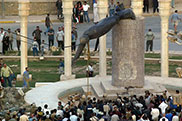 Pascal Guyot/AFP/Getty Images
Pascal Guyot/AFP/Getty Images
Recall that the alleged use of chemical weapons in Iraq just 10 years prior was a major reason America decided to invade that nation.
Clearly, the United States is becoming increasingly war-weary and losing the will to fight.
Promise Fulfilled
Despite waning pride in America’s power, patriotism still exists in the U.S. Often it manifests itself in song, with many of its nationalistic hymns containing a common theme.
- “The Star Spangled Banner” has an additional verse that states: “Blest with vict’ry and peace, may the Heav’n rescued land praise the Power that hath made and preserved us a nation! Then conquer we must, when our cause it is just, and this be our motto: ‘In God is our trust.’”
- “God Bless America” includes the words: “God Bless America, land that I love. Stand beside her, and guide her thru the night with a light from above. From the mountains, to the prairies, to the oceans, white with foam God bless America, My home sweet home.”
- “America the Beautiful” asks that “God shed His grace” on the nation—as well as for God to mend its every flaw.
In each case, the songwriter evoked God and connected it to the well-being and prosperity of the nation.
Many sing these songs glossing over these conspicuous references. There is a reason, though, that America and its history are intrinsically linked to the God of the Bible.
 Michel Gangne/AFP/Getty Images
Michel Gangne/AFP/Getty Images
Thousands of years ago, a promise was made by God to the offspring of the patriarch Abraham. Through a special birthright blessing, God revealed that his descendants, namely Ephraim and Manasseh, would “grow into a multitude in the midst of the earth” (Gen. 48:16). The older brother, Manasseh, was to “become a people, and he also shall be great: but truly his younger brother [Ephraim] shall be greater than he, and his seed shall become a multitude of nations” (vs. 19).
History reveals that only one pair of brother nations has ever become a singular great nation and a multitude of nations—the United States (Manasseh) and Britain with its former colonies (Ephraim). This, along with other undeniable proofs in the scriptures, proves that America—the most powerful and influential single nation to ever exist—is addressed in the Bible!
The blessings promised to these brothers are so abundant that they are described as becoming the standard for prosperity. The next verse states that surrounding peoples would even declare, “…God make you as Ephraim and as Manasseh…” (vs. 20).
The towering influence and sky-high standards of living in America, as with no other nation, are proof of the fulfillment of this. Other nations have craved for its success and striven for it, wishing—“If only we could be prosperous like them!”
Crucial Requirements
Stop and think. U.S. citizens regularly sing about how God made America a nation—and ask Him to bless it. Yet few think of what these words really mean.
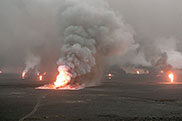 Pascal Guyot/AFP/Getty Images
Pascal Guyot/AFP/Getty Images
The promises to Abraham regarding the future nations of America and Britain were conditional. They were ensured through action. God fulfilled these promises due to the patriarch’s obedience.
Continued blessings require the same today.
Leviticus 26 plainly lays out how national blessings work. God says: “If you walk in My statutes, and keep My commandments, and do them” (vs. 3). What follows in the passage are the benefits the Creator will pour out for keeping His commands. Included are “rain in due season” (vs. 4) and “peace in the land…neither shall the sword go through your land” (vs. 6).
These blessings have historically been the case for the U.S. Since the Civil War, there have been no major military conflicts on our mainland! We have fought all our battles abroad.
Also regarding military might, God details the blessings for obedience: “And you shall chase your enemies, and they shall fall before you by the sword. And five of you shall chase an hundred, and an hundred of you shall put ten thousand to flight: and your enemies shall fall before you by the sword” (vs. 7-8). Again, such dominance was part of America’s past.
But there is a flipside to all of this. Consider again the words from “America the Beautiful.” We ask that God mend our every flaw. In other words, we want God to correct us when we are headed down the wrong path.
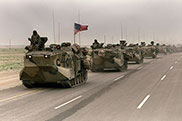 Mike Nelson/AFP/Getty Images
Mike Nelson/AFP/Getty Images
As with any good parent, the God of the Bible lovingly chastises those whom He loves. He does this in the hopes that they can again receive blessings.
Know this: He is chastising the U.S. now.
Notice verse 14: “But if you will not hearken unto Me, and will not do all these commandments…”
The verses that follow look as though they have been ripped from today’s headlines. Verse 16 states, “I also will do this unto you; I will even appoint over you terror…”
We are in the midst of a war on terror!
Continuing, God says that “you shall be slain before your enemies: they that hate you shall reign over you; and you shall flee when none pursues you” (vs. 17).
Most tellingly, He declares, “And I will break the pride of your power…” (vs. 19).
Consider everything you have read until this point. The U.S. is still a powerful nation, but the pride of that power is being broken. This is the true cause for the dramatic decline in American pride.
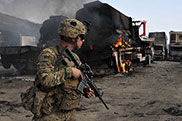 Noorullah Shirzada/AFP/Getty Images
Noorullah Shirzada/AFP/Getty Images
Yet the punishment will not stop there if the U.S. does not heed God’s warning. The rest of Leviticus 26 describes increasingly worsening punishments—all designed so that the nation will wake up!
To better understand the U.S.’s historical and biblical link to ancient Israel, read David C. Pack’s extraordinary book America and Britain in Prophecy. It also provides detailed Bible proofs about coming punishment on the nation.
God does not want it to come to this. Individuals can decide to go down the path of blessings rather than chastisement. But they have to do what God says.
The choice the Creator set before ancient Israel still applies today: “I call heaven and earth to record this day against you, that I have set before you life and death, blessing and cursing: therefore choose life, that both you and your seed may live” (Deut. 30:19).
The United States is at the front edge of a series of “cursings.” You will see them increasing in number and worsening in magnitude over the coming months and years. From here on out, every time you see an example of waning American pride, allow God’s words in Leviticus 26:19 to thunder in your mind: “And I will break the pride of your power …”
Then consider your options.
More on Related Topics:
- Ecuador Prison Deaths Climb Again Despite President’s Security Strategy
- Haiti Faces a Sexual Violence and Abuse Crisis as Gang Violence Spreads, Health Charity Warns
- As Haiti Faces Further Political Turmoil, the UN Signals More Troops on the Way
- Hopeful Yet Wary, Venezuelans Across Latin America Mull Going Home
- Their Homes Survived the Historic LA Area Wildfires. A Year Later, They Fear Living in Them


